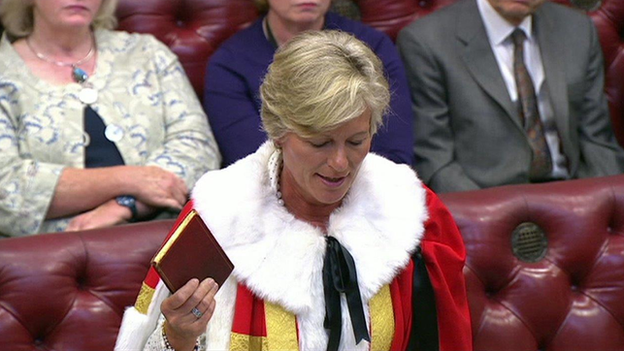Policing, devolution, Syria, and a Lords maiden speech
- Published
- comments

'Although not a native Welsh speaker, dwi'n dysgu Cymraeg....' - Lady Bloomfield's maiden speech
Parliament is currently debating the fourth law changing the Welsh constitution inside two decades.
Each of them has promised, in varying ways, to settle constitutional arguments for, if not a generation, then a long time. The current Wales Bill is no exception, its author Stephen Crabb having set out in 2014 to create "a stable and lasting settlement"., external
Monday's House of Lords debate suggests his goal remains elusive, with peers lining up to highlight the Bill's flaws. Perhaps we should not be surprised.
Wales's newest member of the Lords, Baroness Bloomfield of Hinton Waldrist, external (although she's from Bonvilston), used her speech to remind peers that "the Statute of Rhuddlan in 1284 was intended to settle the government of Wales once and for all following the execution of Dafydd ap Gruffydd, Prince of Gwynedd".
Lady Bloomfield is one of a number of Conservative supporters who were included in David Cameron's resignation honours list., external "Although not a native Welsh speaker, dwi'n dysgu Cymraeg - I am at least a Welsh learner - so it is a great honour to be making my maiden speech in the context of a subject so close to my heart."
Monday's debate featured some familiar arguments from some familiar faces, among them five former secretaries of Wales. Each offered their unique insight into recent Welsh political history.
'Policing'
Lord [David] Hunt said (for the first time, I think, publicly) that the Conservatives under John Major came close to devolving policing to the old Welsh Office in 1992-93.
He spoke of "an agreement I reached with the then Home Secretary, Kenneth Clarke, about the transfer to Wales of powers over the police, but perhaps I should not delve too deeply into that because it was stopped by the bureaucracy of Whitehall. Both Ken and I have several times realised that we face quite a difficult task in taking this further forward and getting it on to the statute book".
Labour's Lord Hain explained openly why the Welsh, unlike the Scots, were not asked a second question on tax in the 1997 referendum - because ministers thought they would lose the vote on devolution.
He said: "There was only one question before voters in 1997: did they want an Assembly or not? There was no second question on whether they wanted income tax devolved, as was specifically and importantly the case in the referendum on a Scottish Parliament. Ministers at the time took the view that to have such a second question in Wales would be to lose the referendum. Given how narrowly it was won, with just 0.2%, how wise that turned out to be."
Peers now have a pause before they begin line-by-line scrutiny of the Bill in November.
For MPs, work on the Wales Bill is (subject to possible parliamentary ping-pong later) all but done. Their focus this week has largely been on Brexit and Syria as they sought to influence both.
On Tuesday, former Welsh Secretary Stephen Crabb used his first speech, external since leaving the cabinet to accuse Russia of behaving like a "thuggish, international gangster".
Cynon Valley Labour MP Ann Clwyd set the agenda for the foreign secretary by suggesting to Boris Johnson that people should demonstrate outside the Russian embassy.
'Strategy'
Mr Crabb's predecessor as Welsh secretary, David Jones, returned to the despatch box to wind up Wednesday's Brexit debate., external With ministers under pressure to reveal their strategy, he explained the UK government's approach in about as much detail as the government is currently willing.
He told MPs: "The government's position is that although the ability to trade with EU member states is clearly vital to our prosperity, there is clearly no mandate for a deal that involves accepting the existing arrangements governing free movement of people from the European Union, but we do not accept that there is a binary trade-off between border control and access to the single market for goods and services."
And in other news, "born-again backbencher" (his words) Paul Flynn revealed he is considering standing for the chair of the home affairs select committee left vacant by Keith Vaz. Mr Flynn may have given up his two shadow cabinet jobs he held during Labour's leadership crisis but his spell in the shadow cabinet has clearly given him a taste for power.